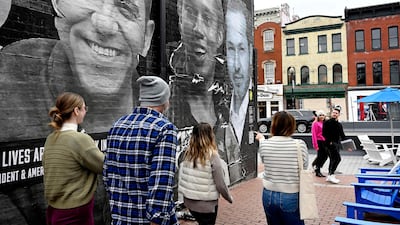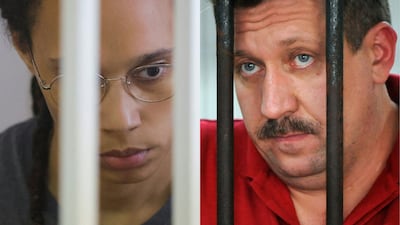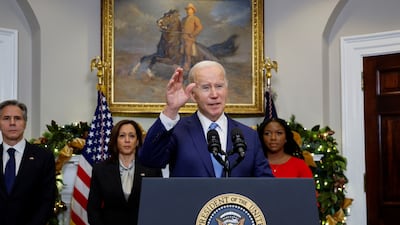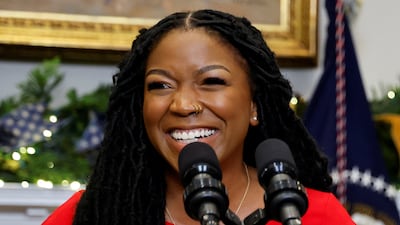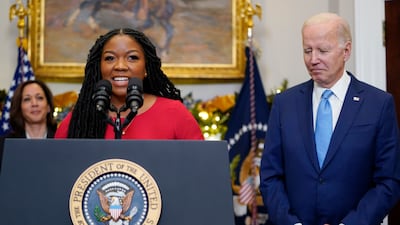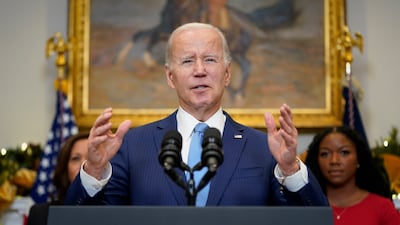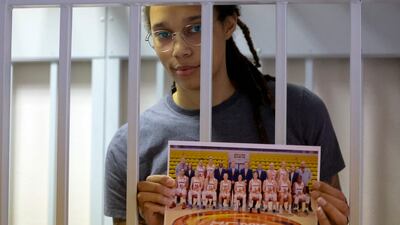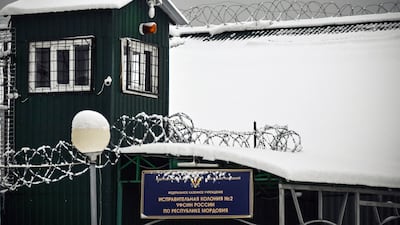Plastered on a brick wall in a narrow alley in the Georgetown neighbourhood of Washington are the faces of 19 Americans detained abroad.
Weathered and peeling, the fading images speak to how long many of them have been imprisoned.
Some like Brittney Griner, the basketball star who spent 10 months jailed in Russia, have been released. But the majority remain captive in countries including Venezuela, Iran, China and Russia.
News of Griner’s release echoed across a small but tight-knit group of families that have banded together to try to collectively bring their loved ones home.
“Brittney's homecoming is a success story,” said Neda Shargi, whose brother Emad Shargi was arrested in Iran in 2018 on espionage charges, an accusation often levied against dual and foreign citizens.
Ms Shargi's brother was released on bail but was not allowed to leave the country. He was arrested again in November 2020.
Mr Shargi, who narrowly survived a fire that ripped through Iran’s notorious Evin prison in October, is one of several Americans currently in Iranian custody.
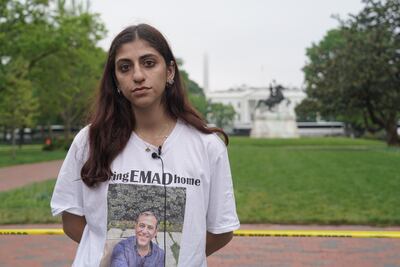
In the four years since he was arrested, Mr Shargi’s family have never stopped fighting for his return.
They helped create the Bring our Families Home Campaign, which installed the mural in Georgetown and works to raise awareness about Americans held overseas.
The group has been a lifeline for families who at times feel lost in the bureaucratic ocean that can be US consular affairs.
“I could not imagine not having this campaign accessible,” said Henry Hernandez, whose brother Eyvin Hernandez has been held in Venezuela since April 2022.
“I wouldn't know what to do.”
Mr Hernandez was detained along the Colombia-Venezuela border with a friend. His family said he never intended to enter Venezuela, but was taken across the border by a gang member.
The US State Department would not disclose how many Americans are currently “wrongfully” detained abroad, saying only that the number is “fluid".

But a recent study released by the James W Foley Legacy Foundation, named in honour of the American journalist killed by ISIS in 2014, suggests that at least 60 Americans are currently detained overseas, some by state actors and others by terrorist organisations.
“From the last decade [there] has been a 175 per cent increase in the number of incidents of Americans being wrongfully detained by foreign governments,” said Cynthia Loertscher, director of Research, Hostage Advocacy and Government Affairs at the foundation.
Ms Loertscher said that, in addition to an increase in Americans being held abroad, the duration of captivity has been increasing as well.
“It is becoming more difficult to resolve these cases,” she told The National.
Griner’s release, which was the result of months of negotiations, has given a modicum of hope to the Shargi family and others.
“If President [Joe] Biden was able to find a way of bringing Brittney back home to us, certainly he can find a way to bring home my brother and the others in Iran,” Ms Shargi told The National.
The Biden administration appears to be taking the issue seriously. In addition to Griner, the administration has brought home a number of other Americans, including Trevor Reed, a military veteran who had been held in Russia, and six Americans who had been detained in Venezuela.
“We're going to continue to work to bring home every American who continues to endure such an injustice,” Mr Biden said on Thursday.
But despite calling it a “priority” for his administration, many families of those detained say that the US still needs to do more.
For years, Ms Shargi has been asking to meet Mr Biden. That hasn’t happened yet.
“It seems like such a small ask, given the ordeal that we're going through,” she said. “They tell us it's a priority. I believe it is and yet some of the things that need to be done to really prove that are still missing.”
She’s not alone: Harrison Li’s father Kai Li has been imprisoned in China for six years. He, too, has been trying to get a meeting the President.
“The only thing concrete that I can ask for right now is again to meet with the President so he knows my dad's name and will treat it with the priority that everybody in the government tells us that they do,” said Mr Li.
It's a wish that Mr Hernandez echoed as well.
For now, the families relish the return of one their own, as they push the government to do more.
